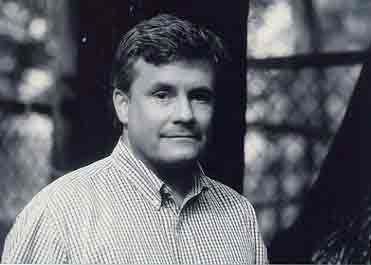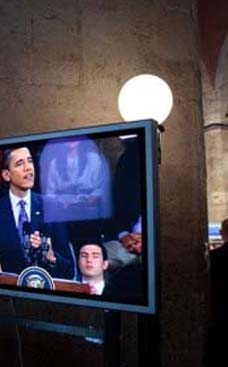
"Through ZheZhe, the Russian public will thus be able to tell their leader (anonymously, if they choose) what they really think of him and his policies – an unheard-of possibility in a land where for decades the adage about the powers that be has been, Do boga vysoko, do Stalina daleko (God is too high to reach; Stalin, too far away.) In earlier centuries, the adage was “tsar” in place of “Stalin,” but in any case, until now, the idea of any sort of open dialogue between ruler and ruled in Russia seemed as intimidating as it was impossible to conceive." Jeffrey Tayler served as a Peace Corps Volunteer in Morocco. He has published numerous articles in Atlantic Monthly, Spin, Harper's and Condé Nast Traveler and is a regular commentator on NPR's "All Things Considered.
Jeffrey Tayler writes: On April 22nd Dmitry Anatol’yevich Medvedev became the first Russian president to launch a comment-enabled blog on Russia’s broadest, most contentious political blogging platform, Zhivoy Zhurnal (LiveJournal)
"Friending" Medvedev
On April 22nd Dmitry Anatol’yevich Medvedev became the first Russian president to launch a comment-enabled blog on Russia’s broadest, most contentious political blogging platform, Zhivoy Zhurnal (LiveJournal), or ZheZhe as it is informally known. He will be blogging by video, so he inaugurated the event with a 5-½-minute video address, taped at his residence, to the Russian blogosphere, which is an exponentially multiplying contingent in the country with Europe’s most rapidly growing population of Net surfers. (Out of 141 million Russians, 29 million were using the Net in 2008, as compared with three million in 2000.) This growth matters: the Net is the last bastion of relatively free speech left in the country. Medvedev had already been making regular Internet appearances (mostly videos of his official doings) last year on kremlin.ru, which requires registration for commenters. His new blog, however, would not require registration, though according to rules posted there, ZheZhe moderators ostensibly charged with screening out hate speech, badly written posts, and obscenities, would monitor the comments section. Through ZheZhe, the Russian public will thus be able to tell their leader (anonymously, if they choose) what they really think of him and his policies – an unheard-of possibility in a land where for decades the adage about the powers that be has been, Do boga vysoko, do Stalina daleko (God is too high to reach; Stalin, too far away.) In earlier centuries, the adage was “tsar” in place of “Stalin,” but in any case, until now, the idea of any sort of open dialogue between ruler and ruled in Russia seemed as intimidating as it was impossible to conceive.
Already Internet-savvy, Medvedev, in his first ZheZhe video, struck a casual note, calculating his dress and demeanor to accord with the Russian blogosphere’s youthful tastes. (His on-screen aura could hardly have contrasted more with that of Prime Minister Vladimir Putin, whose public addresses are marked by icy stares and astringent, hard-hitting rhetoric.) Tieless, wearing jeans, a navy-blue jacket, and a pale blue collared shirt, with a bulky chronograph peeking out from beneath his left sleeve, Medvedev looked relaxed, and even chuckled puckishly at times as he explained that his government’s Internet policy is to provide affordable, quality Web access to as many Russians as possible. He praised as “chief advantages” of the Net the “interesting ideas” and “unusual solutions” to be found on it. And though he took an oblique if tactful swipe at the United States (“The Internet cannot be an environment dominated by rules established by one country, even if it is the most advanced and powerful country”), he stressed that the Web needed to be “open,” an informational zone where the government can interact with citizens. In a country where citizens’ dealings with the government have often consisted of dispossession, secret trials, and exile to labor camps, many Russians are understandably apprehensive about the notion of increased government “interaction.” Medvedev anticipated the skepticism with which his comments might be met, and chose his next words carefully: “The situation regarding openness and the readiness of the state [to provide] various services [online] is, to put it mildly, far from ideal, and to speak frankly, hardly exists. Nevertheless, something is being done.” Toward this end, he added, he had created a Presidential Council For the Development of an Informational Society. He closed his address with an exhortation to the effect of “let the discussion begin!”
Russians immediately hit the keyboards, dispatching posts truffled with English-derived Net slang: zafrendit’ (to friend) and frendy (friends), kamenty (comments), kiberpravitel’stvo (cyber-government) and kiberdemokratiya (cyber-democracy), yuzery (Internet users) etc. The first post reflected a concern that would characterize a good number to come. “Any of us can write what we want, and nothing will happen to us for this?” asked a couple with the nickname yulala_borka. Retrotalk mused, “Interesting. I’d like to joke except that 1: I’m afraid to; and 2: Dmitry Anatol’yevich won’t read our comments.” Sergei_1983 echoed the skepticism, asking, “…will Dmitry Anatol’yevich be answering or writing here himself, or will others [do this for him]?” According to the Moscow Times, Medvedev’s press secretary may post responses, but so far has not. Another yuzer returned to the fear theme: “I feel sorry for those leaving comments here. They can be packed off [to prison]. For a good ten years.”
Given Russia’s history, someone was bound to express this apprehension sooner or later, but no matter how much Putin, or the Putin-Medvedev duumvirate, has restricted media freedoms, they have not returned the country to Soviet levels of repression. Imprisoning hapless bloggers would hardly jibe with one apparent purpose of Medvedev’s site: to create a veneer of democracy (for both domestic and foreign audiences) and to give people a chance to let off steam harmlessly. But in Russia, where the instinct to steer clear of the authorities and watch one’s tongue seems encoded in the national DNA, getting used to mouthing off to the president is going to take some time.
We cannot know for sure whether the blog’s monitors will really restrict themselves to deleting profanity, but criticism of the government and of life in Russia filled the forum. Posts covered a spectrum of discontent, focusing on subjects like official corruption, real estate fraud, traffic jams and highway mortality, bureaucrats and their refusal to deal with the public online, the Russian government’s immemorial indifference to the people it is supposed to serve, and so on. Il_burbero griped, “Some [bureaucrats]” refuse to accept “emails and faxes from citizens. Let me get this straight. I’m a citizen only [if I’m enclosed] in a stamped envelope, but without an envelope I’m a no-name nobody?” Black_rnd had a pointed suggestion for Medvedev that was sure to hit home with his compatriots: “Please set an example for our state functionaries and give out 80 percent of your salary to twenty randomly chosen citizens. Demonstrate to us that the government takes care not only of itself, but of its people, that you’re ready to give your last shirt to hungry people.” One commenter, Andrei Zubarev, an advertising executive from the city of Ryazan’ near Moscow, posted a complaint about terrible conditions at a children’s hospital. Two days later, according to the Moscow Times, staff at Medvedev’s blog informed Zubarev by email that the president was taking up the issue with local authorities, who have since called a news conference – possibly the first step toward action – and the first response of sorts to a post.
Not all respondents were so serious. Podakuni wrote, “I hope we’ll be able to see not just Dmitry Medvedev the president, but also the person.” Prorock: “I know you like rock music. Will you go to the … Alice Cooper concert on June 26th?” Does the president use a MacBook Pro? Can he be “friended?” Why are out-of-date monitors visible in the background? “The country’s president must keep in step with the time, especially where the Internet is concerned,” opined miph. Ilyashershnev (and others) suggested that Medvedev take up Twittering. Comments of this sort flooded in, and many were as trivial as those one would expect to see on any Western forum, if now and then peppered with anti-Western sentiments. “When,” Susdrup asked, “will Russian nuclear missiles fly off to land on the heads of the damned Yankees?!”
There have been more than 8,000 posted responses so far to Medvedev’s inaugural video, and most are positive. By opening a forum on ZheZhe, Medvedev is burnishing his image with the generation that will in short order enter the ranks of politics and business. And he is doing this via the one medium that now counts in Russia. Since Putin began sanitizing the airwaves of the anti-government anger and criticism expressed so freely during the Yeltsin era, any Russian who has needed to know what’s really going on has turned to news and blog sites on the Internet. It is as yet unclear what will come of Medvedev’s ZheZhe initiative. Certainly no harm can result from it, and the initial signs are promising.











